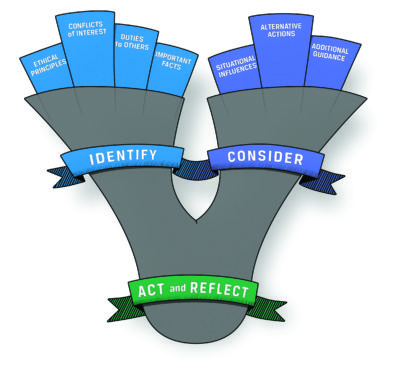Ethics in Practice: Trading in Cryptocurrency OK? Case and Analysis–Week of 13 August
This week’s case came straight from current headlines. How did you do with assessing the trader’s actions?
Cryptocurrencies are continuing to grow as a tradable asset, and some clients may have the risk tolerance to let their investment adviser trade in them. Read this week’s case that delves into this subject and then join the conversation to share what you think of the trader’s actions.
Case
Santos trades digital coins on cryptocurrency exchanges for both his own account and as an investment strategy for clients who have indicated an interest in such speculative trading and for whom it is appropriate. The cryptocurrency exchanges are unregulated markets. Santos is a member of “EasyCoin,” a chatroom in which coin traders gather that has thousands of members. EasyCoin is a private chatroom accessible by invitation only and is overseen by an anonymous moderator. Generally, the chatroom moderator announces a date, time, and exchange for members to initiate trading. At the set time, the moderator informs the chatroom of the particular cryptocurrency to be traded. Traders, including Santos, buy that digital coin creating a surge in the price with the intention of attempting to sell before the price collapses. Over the past several months, 47 different cryptocurrencies have been promoted on EasyCoin and generated $357 million in trades. Santos often profits from the rise in the price of the cryptocurrency by timing his trades correctly, but occasionally he buys and holds the digital coin too long and the price drops steeply before he can sell, causing him to lose money for himself and his clients. Santos actions are
- acceptable because Santos, unlike the moderator of the EasyCoin chatroom, is not actively organizing the trading of the digital coin.
- unacceptable because Santos is engaged in market manipulation.
- acceptable because he voluntarily engages in this speculative trading based on information in a private chatroom.
- unacceptable because speculative trading cryptocurrency in unregulated markets for client accounts is unethical.
Analysis
The facts of this case are addressed by CFA Institute Standard II(B): Market Manipulation, which states that CFA Institute members must not engage in practices that distort prices or artificially inflate trading volume with the intent to mislead market participants. In this case, Santos, at the direction of the moderator in the EasyCoin chatroom, engages in trading with the intent to give the impression of price movement in a financial instrument. The fact that the financial instrument is a cryptocurrency trading in an unregulated market and not a conventional security trading in a public market does not affect the applicability of the standard. Although Santos is not organizing the run-up of the price for digital coin, his actions in trading the coin at the behest of the EasyCoin chatroom moderator at a particular time and on a particular market make Santos a participant in the manipulation scheme. Trading in speculative investments on behalf of himself or his clients is acceptable if appropriate and warranted by clients’ financial circumstances and risk tolerance. But engaging in fraud on the market through market manipulation is a violation of Standard II(B). The best answer is B.
This case is based on a story in the 6 August 2018 issue of the Wall Street Journal.
Have an idea for a case for us to feature? Send it to us at [email protected].
More About the Ethics in Practice Series
Just as you need to practice to become proficient at playing a musical instrument, public speaking, or playing a sport, practicing assessing and analyzing situations and making ethical decisions develops your ethical decision-making skills. The Ethics in Practice series gives you an opportunity to “exercise” your ethical decision-making skills. Each week, we post a short vignette, drawn from real-world circumstances, regulatory cases, and CFA Institute Professional Conduct investigations, along with possible responses/actions. We then encourage you to assess the case using the CFA Institute Ethical Decision-Making Framework and through the lens of the CFA Institute Code of Ethics and Standards of Professional Conduct. Then join the conversation and let us know which of the choices you believe is the right one and explain why. Later in the week, we will post an analysis of the case and you can see how your response compares.
Image Credit: ©CFA Institute


Choice B
As the intention of the buy is to create a surge in prices which accounts to market manipulation .